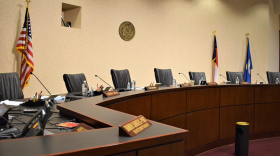Republican legislative leaders have released the final 2023 state budget. It includes wide-ranging provisions that will directly affect North Carolina schools, including teacher pay, private school voucher expansion, and curtailing the powers of the State Board of Education.
A national report put out last year by the Education Law Center ranked North Carolina last among states in school funding effort, taking into account a state’s capacity to pay for education based on its economic output.
Senate Leader Phil Berger said in a statement that the budget will “put student outcomes and parental choice ahead of bureaucracy.”
“We're ranked at the bottom in per pupil spending when looking at national comparisons, and we're prioritizing tax cuts and funding for private schools over fully funding our public education system,” said Lauren Fox, senior policy analyst for the NC Public School Forum.
North Carolina Public Schools are facing an acute, ongoing teacher shortage. In a survey of 101 school districts this fall, the North Carolina School Superintendents Association tallied more than 2,800 vacancies of K-12 teachers across the state.
Raises in teacher salaries that fall short of what educators need
The state budget sets base salaries for teachers that provide the bulk of teachers’ pay, which is then supplemented with other local and, in some cases, state funds.
The new state salary schedule raises a beginning teacher’s base pay from $37,000 to $39,000 and raises the top of the pay scale from $54,000 to $55,100.
The starting pay is less than what the House proposed. House Speaker Tim Moore said his chamber made a compromise with the Senate.
“I would frankly, have liked to have seen more raises,” Moore said, and added that he hopes the General Assembly can provide higher raises in the second year of the biennial budget.
But the raw numbers of the proposed raises aren’t an accurate representation of changes in teacher pay, said Kim Mackey, a 17-year veteran teacher at Wake County Schools.
“The whole point of making money is to buy stuff, so you need to add in inflation,” Mackey said. “Teachers like me, who are veterans, are going to be able to put 2% less in our cart than the year before [on this salary schedule].”
Mackey teaches economics and personal finance and co-created the NC Teacher Tax website. The site offers teachers a tool to calculate the difference between the state base salary schedule the year they became a teacher—adjusted for inflation—compared to what they were actually paid.
“Based on my calculations, from the salary schedule I signed up for to now, I've lost over $84,000,” Mackey says.
Master’s pay not included
The final state budget does not restore a prior salary supplement for teachers who earn a master’s degree. The General Assembly ended this benefit years ago for teachers who began their degree after 2013. The House’s budget proposal would have restored it.
“That was one of the major disappointments for us,” said Lauren Fox, senior policy analyst for the NC Public School Forum.
“When we're in rooms with teacher, master’s pay is constantly brought up in every conversation I'm in as something that would go a really long way in helping teachers’ bottom line, to make it a more affordable profession to work in, but also increasing morale,” Fox said.
Universal private school vouchers
The state budget significantly increases state funding and expands eligibility requirements for vouchers that pay for students who attend private schools.
The budget effectively triples state spending on private K-12 education, and for the first time in North Carolina, students who already attend private schools can apply for an Opportunity Scholarship voucher.
The amount of funding a student receives from the voucher will also increase, up to about $7,500 annually for a student who qualifies for reduced price lunch. Wealthier students will receive smaller voucher amounts, up to 45 percent of what the state pays on average for a public school student.
An analysis by the Office of State Budget and Management estimated this provision could cost traditional public schools about $200 million if half of new voucher recipients previously attended a public school. On the other hand, if more of the new recipients previously attended private schools, that will cost the state more, because it will be funding the private education of students whose families previously picked up the full tab.
The budget also states “it is the intent of the GA to reinvest in the public schools” funds the state saves when a public school student transfers to a private school and receives less than the average state per pupil allocation for a public school student. This would apply to public school students who do not qualify for free or reduced price lunch, who apply for and receive a voucher in fall 2025 or beyond.
The budget includes a new testing requirement for students who receive Opportunity Scholarships, but not all private schools will have to report voucher recipients’ test scores to the state. Only private schools who have at least 25 voucher recipients in each grade will be required to report these scores.
The state superintendent will be charged with recommending a nationally standardized test for private school voucher students to take that can be compared to students in public schools.
The budget provides that $1 million dollars in unexpended funds can go to a contractor for outreach and application assistance. Parents for Educational Freedom confirmed they hold this contract.
The state budget also allows the use of up to 30% of unspent voucher funding in reserves from prior years to be spent on scholarships to eligible students.
Teacher pipeline incentives
NC Teaching Fellows is a program that provides student loans to college students majoring in education that can be forgiven if they go on to teach in North Carolina public schools.
The budget includes provisions to expand NC Teaching Fellows to two additional universities, bringing the total from 8 to 10. It would also expand eligibility from only special education and STEM to include elementary education, and would increase the size of the loan to $5,000 per semester.
The budget establishes a grant program to provide tuition assistance to teacher assistants who pursue a four-year degree to become a teacher. The Department Public Instruction will administer the program, and teacher assistants will be able to apply for up to $4,600 per semester per year to pay for college courses.
The budget reestablishes a prior grant program to reimburse teachers for the cost of obtaining national board certification. A teacher who completes this rigorous process is then eligible for an annual pay supplement.
State Board of Education stripped of power to defund charter schools
One provision prevents the state board of education from withholding or reducing funding to charter schools approved by the Charter Review Board. This comes after the state board of education passed a policy change this month asserting their power to withhold funding—a move that came in response to a recent state law that stripped the state board of education from making final decisions on charter school openings or closures.
Delay in implementation of Parents Bill of Rights
The recently passed “Parents Bill of Rights” solidifies many policies schools commonly have in place to seek parent permission for school activities, and adds requirements that schools inform parents if their child changes their name or pronouns. The budget delays implementation of this until Jan. 2024.
State Superintendent of Public Instruction Catherine Truitt told the state board of education earlier this month that she requested that delay to allow schools more time to figure out the logistics.







